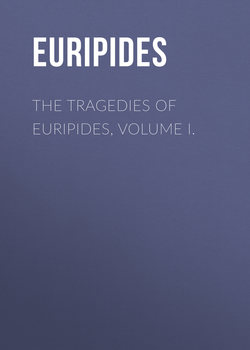Читать книгу The Tragedies of Euripides, Volume I. - Euripides - Страница 27
ORESTES
ORESTES
CHORUS
ОглавлениеThe great happiness, and the valor high sounding throughout Greece, and by the channels of the Simois, has again withdrawn from the fortune of the Atridæ, as of old, from the ancient calamity of the house, when the strife of the golden lamb57 arose among the descendants of Tantalus; most shocking feasts, and the slaughter of noble children; from whence murder responsive to murder fails not to attend on the two sons of Atreus. What seems good is not good, to gash the parents' skin with a fierce hand, and brandish the sword black-stained with blood in the sunbeams. But, on the other hand, to act wickedly58 is mad impiety, and the folly of evil-minded men.
But the wretched daughter of Tyndarus in the fear of death shrieked out, "My son, thou darest impious deeds, killing thy mother; do not, attending to the gratification of thy father, kindle an everlasting disgrace."
What malady, or what tears, or what pity on earth is greater, than to imbrue one's hand in a mother's blood? What a deed, what a deed having performed, does the son of Agamemnon rave with madness, a prey to the Eumenides, marked for death, giddy with his rolling eyes! O wretched on account of his mother, when though seeing the breast bared from the robe of golden texture, he stabbed the mother in retaliation for the father's sufferings.
57
Thyestes and Atreus, having a dispute about their father Pelops's kingdom, agreed, that whichever should discover the first prodigy should have possession of the throne. There appeared in Atreus's flock a golden lamb, which, however, Ærope his wife secretly had conveyed to Thyestes to show before the judges. Atreus afterward invited Thyestes to a feast, and served up before him Aglaiis, Orchomenus, and Caleus, three sons he had by his intrigues with Ærope.
58
Alluding to the murder of Agamemnon by Clytæmnestra. This is the interpretation and explanation of the Scholiast; but it is perhaps better translated, "but on the other hand to play the coward is great impiety, and the error of cowardly-minded men;" the chorus meaning, that this might have been said of Orestes, had he not avenged his father.
